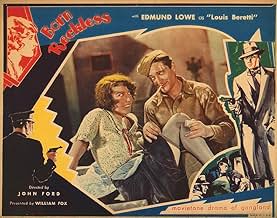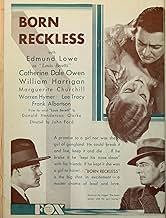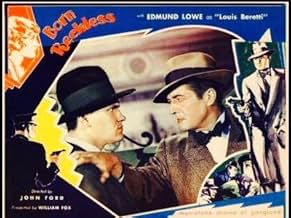Hoping to use the publicity to get re-elected, a judge sentences a notorious gangster to fight in the war.Hoping to use the publicity to get re-elected, a judge sentences a notorious gangster to fight in the war.Hoping to use the publicity to get re-elected, a judge sentences a notorious gangster to fight in the war.
Featured reviews
Better than earlier Ford's but still bad. Flat with so many wasted opportunities to make it better. The plot was reused several times in movies to come and nearly all were vastly superior.
It's a gangster movie with a comic twist set from World War I to ca. 1922. It's one of Ford's earliest sound films.
Louis Beretti (Edmund Lowe) is a hoodlum in a gang run by Big Shot (Warren Hymer), an old friend of Louis's. The movie starts with Louis in a failed jewelry robbery. Then we meet his buddies and his family. Ma Beretti (Ferike Boros) and Pa Beretti (Paul Porcasi) are stereotypical Italians who ignore the reality of what Louis and his friends do. When Louis is caught, the police chief, a candidate for a judgeship, lets Louis go into the army instead.
Frank Sheldon (Frank Albertson) is an army buddy from a wealthy family. Louis is attracted to Frank's sister, Joan (Catherine Dale Owen), but she is already engaged to someone else. Frank dies in the war, but Louis maintains a friendship with Joan.
After the war, Louis operates a speakeasy that sells a lot of smuggled booze (Prohibition began in 1920). Many of Big Shot's gang hang out there, as does an old newspaper friend, Good News Brophy (William Harrigan).
When Joan's baby is kidnapped, she turns to Louis for help, and he must decide how to confront the men he believes carried out the crime.
This is not a terribly sophisticated movie, but it was rather fun to watch. The humor and wordplay in the film's first half were uncommon for this kind of movie. Also, the ending is appropriately ambiguous. Apparently, one of the soldiers in the army sequences was an uncredited John Wayne, but I didn't notice him.
Louis Beretti (Edmund Lowe) is a hoodlum in a gang run by Big Shot (Warren Hymer), an old friend of Louis's. The movie starts with Louis in a failed jewelry robbery. Then we meet his buddies and his family. Ma Beretti (Ferike Boros) and Pa Beretti (Paul Porcasi) are stereotypical Italians who ignore the reality of what Louis and his friends do. When Louis is caught, the police chief, a candidate for a judgeship, lets Louis go into the army instead.
Frank Sheldon (Frank Albertson) is an army buddy from a wealthy family. Louis is attracted to Frank's sister, Joan (Catherine Dale Owen), but she is already engaged to someone else. Frank dies in the war, but Louis maintains a friendship with Joan.
After the war, Louis operates a speakeasy that sells a lot of smuggled booze (Prohibition began in 1920). Many of Big Shot's gang hang out there, as does an old newspaper friend, Good News Brophy (William Harrigan).
When Joan's baby is kidnapped, she turns to Louis for help, and he must decide how to confront the men he believes carried out the crime.
This is not a terribly sophisticated movie, but it was rather fun to watch. The humor and wordplay in the film's first half were uncommon for this kind of movie. Also, the ending is appropriately ambiguous. Apparently, one of the soldiers in the army sequences was an uncredited John Wayne, but I didn't notice him.
With such fluid epics as "The Iron Horse" (1924), "Lightnin'" (1925), "Hangman's House" and "Four Sons" (both 1928) in his resume, it is surprising that Fox would encumber Ford with a dialogue director over and over, but Fox did. In '29's "The Black Watch" it was Lumsden Hare. Andrew Bennison is credited with the stage direction of "Men Without Women" released January 1930. Judging from the result Bennison achieved in "Born Reckless" (released in May 1930), I'm astonished anyone would have given him a second chance.
The photoplay opens with a traveling camera shot of a parade. The camera prowls into a jewelry store where a heist is in progress. Outside, the cops "get wise" when a stolen truck is discovered. An exiting shootout and chase ensues, with our hero, Louis Berretti, gaining refuge at his parents' apartment. Then Bennison's stuff takes over. Well, molasses in Anchorage moves better and the pace of the film congeals. Berretti faces justice (eventually) and is "sentenced" to join the war effort overseas. John Ford stages some excellent sequences here, with Berretti's approbatory service delivering him home a hero. He opens a nightclub which, unfortunately, keeps Berretti rubbing elbows with his old mob and allows plenty scenes filled with Bennison-helmed hubris. The dialogue is not only awkward with head-shaking gaps, but has characters with names like Big Shot putting people "on the spot" [murdered].
Audiences of 1930 could not fast forward but you can and should. Edmund Lowe's performance is nothing like the smooth "Chandu" of a year later and probably should be skipped over to view Ford's impressive set pieces. The swamp at the picture's conclusion cribs Fox's "Sunrise" but remains impressive for an early talkie. I gave it a 7 for Ford's contributions. On the whole, though, this is the kind of film that gave early TV viewers a bad taste for early talkies. Viewers beware.
The photoplay opens with a traveling camera shot of a parade. The camera prowls into a jewelry store where a heist is in progress. Outside, the cops "get wise" when a stolen truck is discovered. An exiting shootout and chase ensues, with our hero, Louis Berretti, gaining refuge at his parents' apartment. Then Bennison's stuff takes over. Well, molasses in Anchorage moves better and the pace of the film congeals. Berretti faces justice (eventually) and is "sentenced" to join the war effort overseas. John Ford stages some excellent sequences here, with Berretti's approbatory service delivering him home a hero. He opens a nightclub which, unfortunately, keeps Berretti rubbing elbows with his old mob and allows plenty scenes filled with Bennison-helmed hubris. The dialogue is not only awkward with head-shaking gaps, but has characters with names like Big Shot putting people "on the spot" [murdered].
Audiences of 1930 could not fast forward but you can and should. Edmund Lowe's performance is nothing like the smooth "Chandu" of a year later and probably should be skipped over to view Ford's impressive set pieces. The swamp at the picture's conclusion cribs Fox's "Sunrise" but remains impressive for an early talkie. I gave it a 7 for Ford's contributions. On the whole, though, this is the kind of film that gave early TV viewers a bad taste for early talkies. Viewers beware.
How much of this film was directed by Andrew Bennison and how much by John Ford is your guess. All I know is that with Ford at the helm, I sure expected more from this very flat film.
"Born Reckless" is a gangster film with rather odd casting. Edmund Lowe stars in this film and frankly he didn't seem at all the gangster type. Part of this might be because I've only seen Lowe in about a dozen films (and he made over a hundred) and none of them ha him playing anything even closely resembling a criminal. Usually, he played very sophisticated and cultured sorts of men and with his lovely diction it just felt odd to have him hanging out with the sorts of Warren Hymer in the film--Hymer usually playing idiots or thugs. So, from the onset I had trouble accepting Lowe in the film--although I like him as an actor.
The other problem I noticed is that the film didn't seem sure whether or not to make Lowe a bad guy or a good guy. At the beginning he seemed kind of bad--after all, he was involved in an armed robbery. then, however, only minutes later he seemed like a swell fella when he met his sister's new boyfriend. And, when the police brought him in because of the robbery, he agreed to serve in WWI in order to avoid prison--and he served with distinction. Later, after he got out, he was not the most law-abiding of citizens (opening a speakeasy), but he also had a very, very moral code--one you'd certainly not expect from the owner of a speakeasy!! As a result, the film was muddled despite having some very interesting elements and a dandy violent finale.
With all the great gangster films of the early 30s, my attitude is that you should see all of them first! With wonderful films like "Scarface", "Littel Caesar" and "Public Enemy" (among others), why mess with this mediocre and poorly written film?
"Born Reckless" is a gangster film with rather odd casting. Edmund Lowe stars in this film and frankly he didn't seem at all the gangster type. Part of this might be because I've only seen Lowe in about a dozen films (and he made over a hundred) and none of them ha him playing anything even closely resembling a criminal. Usually, he played very sophisticated and cultured sorts of men and with his lovely diction it just felt odd to have him hanging out with the sorts of Warren Hymer in the film--Hymer usually playing idiots or thugs. So, from the onset I had trouble accepting Lowe in the film--although I like him as an actor.
The other problem I noticed is that the film didn't seem sure whether or not to make Lowe a bad guy or a good guy. At the beginning he seemed kind of bad--after all, he was involved in an armed robbery. then, however, only minutes later he seemed like a swell fella when he met his sister's new boyfriend. And, when the police brought him in because of the robbery, he agreed to serve in WWI in order to avoid prison--and he served with distinction. Later, after he got out, he was not the most law-abiding of citizens (opening a speakeasy), but he also had a very, very moral code--one you'd certainly not expect from the owner of a speakeasy!! As a result, the film was muddled despite having some very interesting elements and a dandy violent finale.
With all the great gangster films of the early 30s, my attitude is that you should see all of them first! With wonderful films like "Scarface", "Littel Caesar" and "Public Enemy" (among others), why mess with this mediocre and poorly written film?
Born Reckless (1930)
* 1/2 (out of 4)
John Ford drama about a wannabe gangster (Edmund Lowe) who gets busted after a heist but instead of going to prison, the judge makes a deal with him. Instead of jail the man will enlist for WW1 and if he serves his country proudly then the judge will throw out the evidence against him. This all goes well and the man returns home a war hero but he soon learns that his old gang has killed his brother in law so he goes out for revenge no matter what it might cost him. In the end, this film is killed by its standard and routine screenplay, which tries to do way too much and it doesn't do any of them in any original form. The movies tries to mix the gangster genre with a war genre with an added touch of the revenge drama but all three are boring and don't feature anything we hadn't seen countless times in the silent era. I've never been a fan of Lowe but he actually comes off decent here and plays the role off as well as can be expected. The supporting cast, including Lee Tracy, are all standard and forgettable. The climax of the movie is certainly the best thing and Ford's use of a swinging door leads to a great thing but there's nothing else going on here.
* 1/2 (out of 4)
John Ford drama about a wannabe gangster (Edmund Lowe) who gets busted after a heist but instead of going to prison, the judge makes a deal with him. Instead of jail the man will enlist for WW1 and if he serves his country proudly then the judge will throw out the evidence against him. This all goes well and the man returns home a war hero but he soon learns that his old gang has killed his brother in law so he goes out for revenge no matter what it might cost him. In the end, this film is killed by its standard and routine screenplay, which tries to do way too much and it doesn't do any of them in any original form. The movies tries to mix the gangster genre with a war genre with an added touch of the revenge drama but all three are boring and don't feature anything we hadn't seen countless times in the silent era. I've never been a fan of Lowe but he actually comes off decent here and plays the role off as well as can be expected. The supporting cast, including Lee Tracy, are all standard and forgettable. The climax of the movie is certainly the best thing and Ford's use of a swinging door leads to a great thing but there's nothing else going on here.
Did you know
- GoofsAt the start of the film there are two gangsters burgling a jewelry store. One turns on a flashlight and the other chastises him for turning on the flashlight and then swats at it. But as he is chewing him out, the flashlight stays lit for about 4 seconds. A truly professional criminal would known better to have left that light on for those 4 seconds. A truly profession criminal would have swatted at the light first to get it out as quickly as possible, then, and only then, would he have reamed the torch bearer out.
- Quotes
Louis Beretti: Say, this room ain't big enough for both of us. This town ain't big enough. If you ever bump into me, you better see me first, you dirty, sneaking rat!
- SoundtracksOver There
Composed by George M. Cohan
Details
- Runtime
- 1h 22m(82 min)
- Color
- Aspect ratio
- 1.20 : 1
Contribute to this page
Suggest an edit or add missing content
































